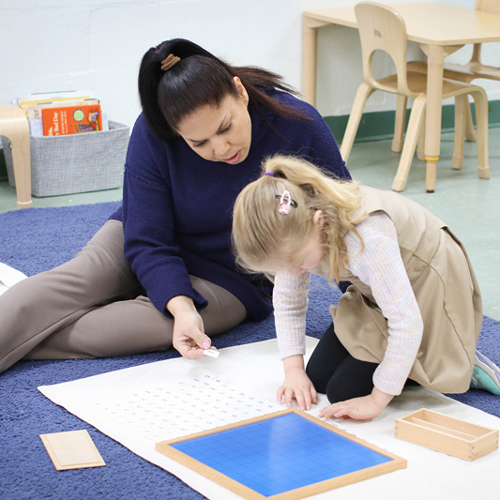Hooray! It’s conference time! This is an exciting time of the semester because it’s one of the few instances when adults make time specifically to sit down together and share information about our children. We see ourselves as a team – parents at home and teachers at school – working together to provide the best collective environment for children to learn and flourish. So whether your appointment is in person or virtual, these meetings are your chance to get a little peek into your child’s life and experiences while they are with us at school. Our goal is always to provide you with the information you need to support your child’s individual growth and development, and these chats are an important way for us to do just that.

During these meetings, you can expect to hear about the work your child is accomplishing at school. We may recount positive learning experiences, share their current areas of interest, and other stories and memories that stand out across the days. This is also when we will share how your child(ren) is navigating the following areas of progress: curricular areas of the classroom, behavioral development, social, or emotional progressions. All of these topics should come as no surprise and simply be extensions or elaborations on conversations or communications you’ve been having with your child’s teacher(s). Because we have this slightly longer period of time, we can share more!
As parents, you can prepare for these informative chats to get the most out of the short periods of time. Bringing a pen and paper or other way to take notes is a great idea. We really try to pack in the information, so taking notes can help you remember key ideas. It’s also a nice way to show appreciation for the preparation your child’s teacher has done. As mentioned earlier, we are all a team supporting your child’s development, and the teachers are sharing these anecdotes and thoughts to help ensure that the team is all on the same page. Remember that this is your time to gain insight into the part of your child’s day for which you are not present. Ask questions that will help you to make the transitions between school and home more fluid. For example, pay attention (and maybe write down) the terminology the teacher uses. Does she refer to group time as ‘circle time’ or ‘storytime’ or something else? Using these words and phrases consistently between school and home helps maintain your child’s sense of order and encourages a stronger feeling of confidence in their environment and their own place in that environment. For younger children, consistency of vocabulary also helps them acclimate to transitions and engenders feelings of stability. Hearing Mom and Dad use the same words as their teacher creates a relationship between parents and teachers as people who can be trusted, relied upon, and as sources of comfort.
Finally, a common question we hear from parents is, “what can we do at home?” Our most frequent response is, “do you read to your child for 45 minutes each day?” If not, that’s a great place to start. There are many reasons reading aloud is our go-to answer. It exposes your child to a wider vocabulary than they’ll typically encounter in conversation. Hearing spoken language teaches your child pronunciation and verbal fluency – the way words come together with emphasis to convey meaning and express emotion. Spending 45 minutes reading to your child is also just spending 45 minutes with your child. In our busy lives, it can be difficult to block off chunks of time that big for anything. But one of the best ways to bond with and maintain a strong relationship with your child is spending dedicated time with them. There are many more reasons we love this practice, but we’ll leave it there for now.
Reading is our first recommendation, but possibly you’re already doing that or there’s something else your teacher might suggest with your child’s unique developmental progression in mind. Ask questions for clarification if you’re unsure of anything and ask about ways to follow up. Teachers spend significant time preparing for each of these important meetings. Your children and their individual development is paramount in our every day work and we consider these meetings opportunities to further support that growth. There’s only so much we can accomplish in the limited hours we spend with your children, so we prepare our notes carefully to help ensure that you have the tools and information you need to continue that work at home.
